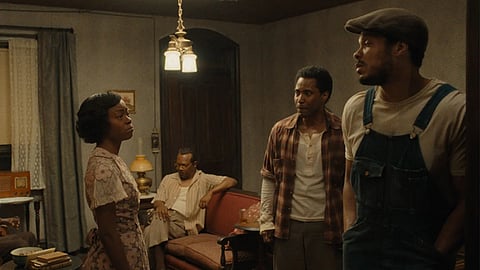The Piano Lesson Movie Review: A poignant exploration of African American life at the threshold of freedom
The Piano Lesson(3 / 5)
An adaptation of August Wilson's play, The Piano Lesson provides an insightful look into the lives of African Americans in the 1930s. Blending supernatural undertones with a historical lens, the film portrays the challenges of the first generation of free Black Americans grappling with whether to embrace their past or forge a new future alongside the white majority.
Director: Malcolm Washington
Cast: Samuel L. Jackson, John David Washington, Ray Fisher, Danielle Deadwyler, Stephan James
Language: English
The story begins on July 4, 1911, with Boy Charles (Stephan James) stealing a piano from the Sutter family, who once enslaved his ancestors. This act is met with retaliation in the form of an arson attack, which results in his death. Twenty-five years later, his children—Berniece (Danielle Deadwyler) and Boy Willie (John David Washington)—disagree over the piano. Berniece views it as a sacred family heirloom, while Boy Willie wants to sell it to buy the Sutter land that has gone up for sale following James Sutter’s (Jay Peterson) death. The central conflict revolves around who will ultimately determine the piano’s fate.
The drama takes place mostly within the home of Doaker Charles (Samuel L. Jackson), Berniece and Boy Willie’s uncle. The setting mirrors a stage, with characters entering and exiting, making for a seamless theatre-to-film adaptation.
As the central conflict is established early, the film relies on its characters to keep the narrative engaging, and the cast delivers. Each actor brings nuance to their roles: Berniece fights to preserve the family’s heritage, while Boy Willie sees the piano as a reminder of their enslavement and hopes to trade it for a better future. Doaker remains neutral yet wise, while Wining Boy, unlike the others, is consumed by nostalgia for his past musical glory.
This humanisation of characters is enhanced by performances from Samuel L. Jackson, John David Washington, Ray Fisher, and Michael Potts, many of whom reprise their roles from the 2022 Broadway revival.
In the early moments, we empathize with Boy Willie’s pragmatic desire to move forward. But the significance of the piano, with its engravings of the family’s ancestors, gradually shifts sympathy toward Berniece. The haunting of Doaker’s residence by Sutter’s spirit reinforces philosopher George Santayana’s saying: “Those who cannot remember the past are condemned to repeat it.” In the film’s climax, Berniece plays the piano to summon her ancestors and banish Sutter’s ghost, reinforcing the importance of never losing sight of history.
While the film succeeds in delivering its moral lesson, some aspects feel underdeveloped. A deeper dive into Berniece’s ancestors would have added richness, and emotional moments, such as Boy Charles engraving his family’s images on the piano at his enslaver’s behest, could have been more impactful.
The Piano Lesson serves as an important reflection on the history of slavery, capturing the struggle for dignity and financial stability during the Great Depression with marked poignancy.


